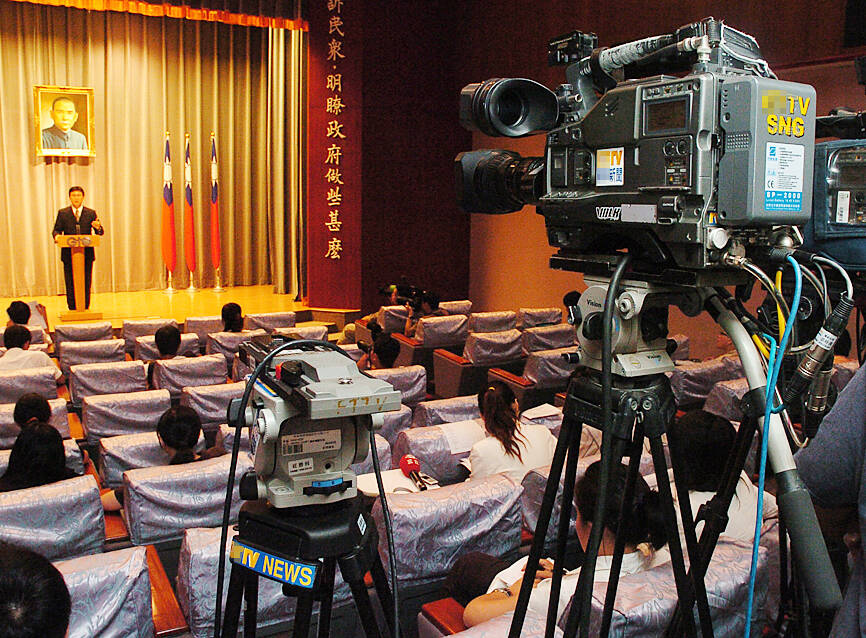A Chinese Nationalist Party (KMT) legislator has proposed amendments to allow the government, political parties and the military to indirectly invest in broadcast media, prompting concerns of potential political interference.
Under Article 1 of the Satellite Broadcasting Act (衛星廣播電視法), the government and political parties — as well as foundations established with their endowments, and those commissioned by them — cannot directly or indirectly invest in satellite broadcasting businesses. A similar regulation is in the Cable Radio and Television Act (有線廣播電視法).
“The purpose of banning the government, political parties and the military from investing in the media is to prevent them from interfering in freedom of speech. However, regulations should allow for pure financial investments in broadcast media,” KMT Legislator Chen Hsueh-sheng (陳雪生) said.

Photo: Taipei Times file
Although the acts protect television media from political and military influence, they also deny the media industry the opportunity to grow and prosper, he said.
“My proposed amendments still ban the government, political parties and the military from directly investing in broadcast media and cable systems in accordance with the guiding principle of the legislation. However, they would be allowed to indirectly hold no more than 10 percent of shares in them. Meanwhile, such a rule does not apply to investments from the government and state-run corporations,” Chen said.
Democratic Progressive Party (DPP) legislators said the investment ban should not be relaxed given the current political atmosphere.
DPP caucus secretary-general Rosalia Wu (吳思瑤) yesterday said that the public would agree that broadcast media should be free from political influence, adding that such proposals needs further deliberation.
DPP Legislator Lin Chun-hsien (林俊憲) said the amendments create legal and political problems.
“Even though the proposals say a 10 percent cap would not apply to investments from the government or state-run corporations, I think we should not rashly tackle this issue in the current political atmosphere,” he said.
If an opposition party accuses a news channel of giving it unfavorable coverage, and the government is an indirect investor of that channel, it could be easily construed to be a government ploy to use the media to attack opposition parties, Lin said.
The government would still be considered to have influence over a certain media outlet even if it does not own many shares in it, he said.
National Communications Commission Secretary-General Huang Wen-che (黃文哲) said the ban is a fundamental requirement to protect freedom of the press, adding that it should be adjusted through amendments, rather than being abolished completely.
Taiwan Forever Association chairman Huang Di-ying (黃帝穎), who is a lawyer, said that easing or lifting restrictions on media ownership could open the door for the government, political parties or the military to intervene in the operations of media companies.
“In practicality, holding 10 percent of a large firm could give a shareholder the power to influence its operation. That is a risk we cannot afford as a democratic country, one for which we have to be cautious,” Huang said.

People can preregister to receive their NT$10,000 (US$325) cash distributed from the central government on Nov. 5 after President William Lai (賴清德) yesterday signed the Special Budget for Strengthening Economic, Social and National Security Resilience, the Executive Yuan told a news conference last night. The special budget, passed by the Legislative Yuan on Friday last week with a cash handout budget of NT$236 billion, was officially submitted to the Executive Yuan and the Presidential Office yesterday afternoon. People can register through the official Web site at https://10000.gov.tw to have the funds deposited into their bank accounts, withdraw the funds at automated teller

PEACE AND STABILITY: Maintaining the cross-strait ‘status quo’ has long been the government’s position, the Ministry of Foreign Affairs said Taiwan is committed to maintaining the cross-strait “status quo” and seeks no escalation of tensions, the Ministry of Foreign Affairs (MOFA) said yesterday, rebutting a Time magazine opinion piece that described President William Lai (賴清德) as a “reckless leader.” The article, titled “The US Must Beware of Taiwan’s Reckless Leader,” was written by Lyle Goldstein, director of the Asia Program at the Washington-based Defense Priorities think tank. Goldstein wrote that Taiwan is “the world’s most dangerous flashpoint” amid ongoing conflicts in the Middle East and Russia’s invasion of Ukraine. He said that the situation in the Taiwan Strait has become less stable

CONCESSION: A Shin Kong official said that the firm was ‘willing to contribute’ to the nation, as the move would enable Nvidia Crop to build its headquarters in Taiwan Shin Kong Life Insurance Co (新光人壽) yesterday said it would relinquish land-use rights, or known as surface rights, for two plots in Taipei’s Beitou District (北投), paving the way for Nvidia Corp to expand its office footprint in Taiwan. The insurer said it made the decision “in the interest of the nation’s greater good” and would not seek compensation from taxpayers for potential future losses, calling the move a gesture to resolve a months-long impasse among the insurer, the Taipei City Government and the US chip giant. “The decision was made on the condition that the Taipei City Government reimburses the related

FRESH LOOK: A committee would gather expert and public input on the themes and visual motifs that would appear on the notes, the central bank governor said The central bank has launched a comprehensive redesign of New Taiwan dollar banknotes to enhance anti-counterfeiting measures, improve accessibility and align the bills with global sustainability standards, Governor Yang Chin-long (楊金龍) told a meeting of the legislature’s Finance Committee yesterday. The overhaul would affect all five denominations — NT$100, NT$200, NT$500, NT$1,000 and NT$2,000 notes — but not coins, Yang said. It would be the first major update to the banknotes in 24 years, as the current series, introduced in 2001, has remained in circulation amid rapid advances in printing technology and security standards. “Updating the notes is essential to safeguard the integrity